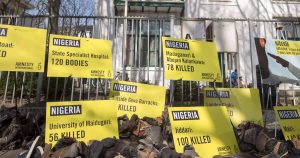Trouble does not appear to be over for the Nigerian military, image wise, as Amnesty International, (AI) opens another flank on its human rights records in the prosecution of the counter-insurgency operation, (COIN) against Boko Haram. In the current report echoed by Associated Press, at least 10,000 civilians are said to have perished in Nigerian military custody since 2011.
Published only yesterday, there are no words yet from the Nigerian military and the question is whether the world might be getting a more nuanced reply from the military this time.

Previous shots from AI
This is not the first time AI has put the Nigerian military under close marking in the prosecution of the war against insurgency. The first report that incensed the military came out in 2015. Titled “Stars on Their Shoulder, Blood on Their Hands: War Crimes Committed by the Nigerian Military”, it told the same story of arbitrariness in dealing with categories that have very little or no likelihood of conscious involvement in the insurgency by ordinary standard of reasoning.
While such records of arbitrariness is a sensitive matter to all those concerned with the global efforts at humanizing war, the Nigerian military seems to always feel that actors such as AI are poking nose in a purely military matter. As such, the military and actors such as AI have remained at loggerhead over a matter that could cast a huge black dot on the military’s image at a particularly tasking moment for everyone such as Nigeria of today.
It is not clear why the military tends to take offence on the reports and reacts in a manner that tend to give it away on the imperative of a ‘hygienic war’. The military’s angry style of reaction is worsened by what observers see as the distance of its propagandists from even a decent argument such as the position of scholars of ‘Just War’ to the effect that promoting ‘Just War’ is complicity in war. This is the position of the most humane critics of the agenda of the possibility of clean human rights records in war who would prefer a complete anti-war campaign rather than what they regard as a spurious distinction between ‘Just’ and ‘Unjust’ war.

Sagir Musa, spokesperson for the army before his recent elevation in rank
Instead of such a more plausible answer to charges of arbitrariness, there is either flat denial or attitude of charging at AI and any other observers who say that conduct of war is not an automatic license for massive human rights violations, especially when such have been creditably documented as appears to be the case now.
AP’s report based on a synthesis of data by AI said all the deaths in this case occurred as a result of their being detained in connection with the Boko Haram insurgency in northeast Nigeria. The hub is said to be what the report codifies as the “infamous Giwa Barracks,” in Maiduguri from where 166 corpses were reportedly transferred to the mortuary in April 2017 alone.
Another quote from the report which Intervention has not seen though says “severe overcrowding, scarce food and water, extreme heat, infestation by parasites and insects, and lack of access to adequate sanitation and health care are among the litany of violations at Giwa.
To make matters worse, the report says older people were not spared what it calls the military’s practice of widespread detention of those fleeing Boko Haram areas, usually without evidence that such persons were linked to the armed group, much less involved in violence.
AP also quotes AI as saying it reviewed over 120 images of corpses brought from the barracks to a local mortuary and spoke to individuals with direct knowledge of the detentions. Their estimate is that up to 25% of those who died were older men.
The report has been followed by the standpoint of a critical constituency such as the Concerned Nigerians which said Wednesday that the Zabarmari massacre in Borno State last week must be the red line of insecurity in the country. Nigerian military which is the vanguard of the COIN in the Northeast of the country has found itself embattled. The diversity encrusted in the ‘Concerned Nigerians’ makes its standpoint crucial although it is time the platform takes a more definitive name than the present one which suggests a spectrum of unconcerned Nigerians. The point, however, is that several other domestic actors will support their task for the military. Dominant opinion is that the COIN has become too prolonged and while there is widespread call for removing the service chiefs, the military throws the charge of destabilization or subversion against such critics.
There doesn’t appear to be that solid national consensus among the men under arms and those not under arms on the war against the insurgency. Not only that, there isn’t a hegemonic narrative of the COIN either just as the medialization of the operation is no less problematic, especially when contrasted to the successfully homogenous self-representation of the insurgents.
How could there be so much fragmentation in a country at a time consensus is most needed?




























